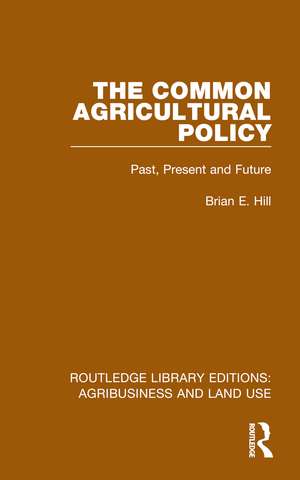The Common Agricultural Policy: Past, Present and Future: Routledge Library Editions: Agribusiness and Land Use
Autor Brian E. Hillen Limba Engleză Hardback – 26 iul 2023
Din seria Routledge Library Editions: Agribusiness and Land Use
- 15%
 Preț: 700.30 lei
Preț: 700.30 lei - 15%
 Preț: 644.04 lei
Preț: 644.04 lei - 40%
 Preț: 504.22 lei
Preț: 504.22 lei - 15%
 Preț: 648.10 lei
Preț: 648.10 lei - 15%
 Preț: 646.81 lei
Preț: 646.81 lei - 15%
 Preț: 651.22 lei
Preț: 651.22 lei - 15%
 Preț: 645.16 lei
Preț: 645.16 lei - 15%
 Preț: 639.79 lei
Preț: 639.79 lei - 15%
 Preț: 643.86 lei
Preț: 643.86 lei - 15%
 Preț: 648.47 lei
Preț: 648.47 lei - 39%
 Preț: 510.81 lei
Preț: 510.81 lei - 15%
 Preț: 645.81 lei
Preț: 645.81 lei - 15%
 Preț: 647.28 lei
Preț: 647.28 lei - 15%
 Preț: 644.19 lei
Preț: 644.19 lei - 15%
 Preț: 645.02 lei
Preț: 645.02 lei - 15%
 Preț: 646.49 lei
Preț: 646.49 lei - 15%
 Preț: 639.79 lei
Preț: 639.79 lei - 39%
 Preț: 629.82 lei
Preț: 629.82 lei - 15%
 Preț: 644.51 lei
Preț: 644.51 lei - 15%
 Preț: 645.49 lei
Preț: 645.49 lei - 15%
 Preț: 638.78 lei
Preț: 638.78 lei - 34%
 Preț: 11358.66 lei
Preț: 11358.66 lei - 15%
 Preț: 710.28 lei
Preț: 710.28 lei - 15%
 Preț: 647.93 lei
Preț: 647.93 lei - 15%
 Preț: 710.28 lei
Preț: 710.28 lei - 38%
 Preț: 638.57 lei
Preț: 638.57 lei -
 Preț: 293.28 lei
Preț: 293.28 lei -
 Preț: 283.65 lei
Preț: 283.65 lei
Preț: 643.53 lei
Preț vechi: 757.10 lei
-15% Nou
Puncte Express: 965
Preț estimativ în valută:
123.13€ • 129.25$ • 102.21£
123.13€ • 129.25$ • 102.21£
Carte tipărită la comandă
Livrare economică 10-24 aprilie
Preluare comenzi: 021 569.72.76
Specificații
ISBN-13: 9781032467009
ISBN-10: 1032467002
Pagini: 186
Dimensiuni: 138 x 216 mm
Greutate: 0.5 kg
Ediția:1
Editura: Taylor & Francis
Colecția Routledge
Seria Routledge Library Editions: Agribusiness and Land Use
Locul publicării:Oxford, United Kingdom
ISBN-10: 1032467002
Pagini: 186
Dimensiuni: 138 x 216 mm
Greutate: 0.5 kg
Ediția:1
Editura: Taylor & Francis
Colecția Routledge
Seria Routledge Library Editions: Agribusiness and Land Use
Locul publicării:Oxford, United Kingdom
Public țintă
General, Postgraduate, Professional, and UndergraduateCuprins
1. Agriculture and Economic Development 2. The Development of Modern Agriculture: Problems and Policies 3. The Development of the Common Agricultural Policy 4. Monetary Problems 5. Mountains and Lakes: The Problem of Surpluses 6. Common Financing 7. Achievements of the Common Agricultural Policy 8. Reform of the Common Agricultural Policy 9. The Common Agricultural Policy: Immutable or Transitional?
Recenzii
‘Written in an easy-to-read style, this text…is a valuable digest of the problems and policy changes of the CAP.’ Brian Ilbery, Geography Vol 70, No. 2
Descriere
Originally published in 1984, this book provides an introduction to the history of agriculture in Western Europe, states the case for government intervention and analyses the operation of the Common Agricultural Policy (CAP) during the late 20th Century.
